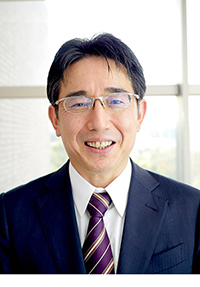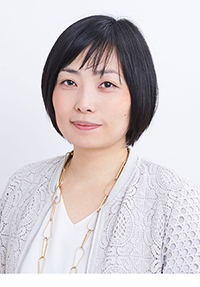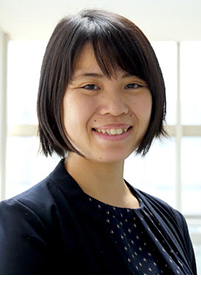
The role of nursing is crucial in the healthcare of older people. What is the role that is now required of us? Professor Takeya, Associate Professor Yamakawa and Assistant Professor Koujiya send a message to students aiming to enter this field.
What we want to transmit from Osaka to the world

Osaka University Graduate School of Medicine, Division of Health Sciences
Yasushi Takeya, MD, Ph.D.
Experience is a treasure
Have you ever heard of ward medical director? It is very close to the clinical setting, and I was there for almost 10 years. The ward medical director's role is to manage own ward, dealing with doctors and nurses from other departments, securing beds, dealing with complaints, being the primary doctor, as well as supervising residents and students. We resolve various issues while keeping abreast of the patient's situation and respecting the ideas of the doctors and nurses. The ward medical director is like a field supervisor on the front line and has to rush in at night or on weekends if anything goes wrong, so most of them are replaced after about three years, even if they have been there for a long time.
Before I knew it, I have gained what seems very significant during that time. That is the connections with people. If I need to know something or have a problem, the people on the wards are always ready to help, and when I start something new within the university, many colleagues are there to help. This is an invaluable treasure for me. It is a connection that I have gained because I have known the field and understood the feelings of the people working at the end of the line.
Thankfully, I still see patients on the wards four days a week as deputy director. I have an outpatient clinic and am also responsible for the dementia team, but I don't just help out. I want to bring what I have learnt there to this department.
Nurses-centered
Healthcare for older people has changed significantly from 'cure' medicine to 'cure and support' medicine. Older people with non-curable disabilities and many chronic diseases are not just patients, but people living in the community. What I would like to convey to you who are interested in gerontological and geriatric nursing is that healthcare for the older people is an area in which nursing has an extremely important role to play. Unlike the young, middle-aged and healthy older people, the medical problems of the frail in the early and late stages of life require a viewpoint that sees the older people not only as sick people, but also as people in their own lives, and it is not easy for doctors alone to solve these problems.
While there are many things that cannot be cured, there are many things that can be supported. This is exactly where nurses are activ. Not only to cure, but also to support daily life as a person living with an illness that cannot be completely cured and support life. This is the mission of nurses and a joy that only nurses can experience.
Having a determination
In healthcare for the older people, nurses are at the centre, working with doctors, pharmacists, therapists, care workers and social workers to support patients as consumers. This is a perspective that has not existed in nursing in the past. Without dreaming of something as drastic as this, gerontological and geriatric nursing would not develop significantly, and that would not be good for geriatrics. I was taught that geriatricians should not only see the older people as sick people, but also as living people. Gerontological and geriatric nursing has a role to play to take care them as living people. Nurses work closest to the older people, accompanying them in their unique life and living, and tackling what doctors cannot do.
Gerontological and geriatric nursing supports what is lacking in geriatrics.
To this goal, it is important to continue research. Based on scientific evidence, doctors and nurses work together and complement each other. I would like to transmit this from Osaka to the world. We are proud of our profession as nurses, and we have a strong responsibility and determination to support the lives of the older people.
Everything starts with a change in nurses

Osaka University Graduate School of Medicine, Division of Health Sciences
Miyae Yamakawa, RN, PHN, Ph.D.
Living with Disease
My first career as a nursing researcher was in diabetes research, primarily about maintaining and restoring the health of people in the workforce. It was during that time that I experienced that even if a person has diseases that are not minor if the environment around they can be appropriately adjusted, they can live a reasonably satisfying life despite the disease. This idea is also fundamental when considering nursing care for the geriatric population. There are various difficulties, such as the fact that it is difficult for people to return to their normal lives 100% of the time after becoming ill or at the end of their life. The same is true for dementia care, which is my main area of research. Furthermore, there are not only physical difficulties but also changes in daily life and relationships that occur as we age that we have no control over.
But is getting older all bad? It is important to believe that longevity is not a bad thing. I would like my life to be more joyful about reaching old age without losing my life to a serious illness, incident, or accident, and I hope that all people can do the same.
The Power of Gerontological and Geriatric Nursing to Overcome Contradictions in Health Care
The activities of human life are endless. It is characteristic of the geriatric person that there is one health problem and when it is cured, all is not ok. For example, we often hear stories of people being hospitalized for pneumonia, being given antibiotics and the pneumonia being cured, but then "coming back from the hospital get senile. In other words, there is a limit to being involved with a person only from a medical point of view, that is, to treat theirs. I always keep in mind that people living in old age are not patients but "consumers," and I hope that they will lead irreplaceable lives, not only in the present but also in the future, and I hope that the nursing profession can make some contribution to this. To keep the goal of living a happy life unchanged, we will continue to promote education and research that can be changed flexibly. Gerontological and geriatric nursing is not an area where we can collectively say, "If we did B to person A, they got better. Times have changed, and each individual's life is becoming more and more diverse. Therefore, uniform interventions will not work. In other words, there is no manual. Also, it is really common that what works for some people will not work for others. That is why existing methods, whether in practice or research, will not work. Gerontological and geriatric nursing is always thinking and trying. And then think again. I would like to study together with everyone so that we can always keep our minds softened toward the unchanging goal of ending life with a good feeling.
What doesn't work alone, works when we do it together.
These are words I learned from one of care providers. To support one person's life, we need to consider many perspectives. Although many opinions may not come together well, it is better than thinking alone. For this reason, our research unit also focuses on training people who can bring together various perspectives from multiple professions and industries in a flat manner. We believe that Gerontological and geriatric nursing can contribute to making your irreplaceable life a good one. I look forward to the opportunity to study with you all.

Osaka University Graduate School of Medicine, Division of Health Sciences
Eriko Koujiya, RN, PHN, Ph.D. Career
Recuperate at home and your mind and body will feel better.
Recuperate at home and your mind and body will feel better.
As my research theme, I would like to provide evidence-based methods for approaching the older people to spend their final days in their familiar homes. This goal is based on the invisible power I felt when I was a ward nurse, which cannot be obtained through treatment in a hospital, but only at home.
Many older patients want to go home but are forced to stay in the hospital because they have to give priority to treatment. However, even if the disease is well controlled during hospitalization, ADL, cognitive function, and even mental health problems often occur.In such cases, after being discharged from the hospital, they feel a greater sense of burden than they had imagined. This is true not only for the patients but also for their caregivers.
On one occasion, we had a patient whose disease was not well controlled, but who was very disturbed during his hospitalization and strongly wanted to go home as soon as possible. When we met him in the outpatient clinic after his discharge from the hospital, we saw a very peaceful expression on his face, which we had not seen during his hospitalization, and we could see that he was leading a positive life. This made me think again about what the priority goals are for the older people as they live through their illnesses. I have not yet found the answer to this question, but at the least, if the patients want to go home and stay at home until the end of their lives, I would like to do my best to support their wishes, not only from the medical field but also from the academic world.
Breaking down barriers between the hospital and the community/home to ensure stable medical care
In the field of community and home health care, which gerontological and geriatric nursing should pioneer, the secret is "collaboration among multiple professions. In the hospital wards, many patients were repeatedly admitted and discharged in a short period, so much so that we became acquainted with them. So, although we vaguely wondered "what kind of life did they lead at home...", we could not get a realistic picture of their recuperation life only with subjective information from the patients. However, I did not know how to communicate closely with visiting nurses and home doctors, and I always felt an "invisible wall" between the hospital and the home. Later, when I gained experience as a visiting nurse, I again hit the wall between the hospital and the community, wondering "What on earth was the patient's reaction to this care in the hospital...?” I feel that this wall is simply a lack of "opportunities" to connect between the different fields. Avoiding hospitalization, which can interrupt home care, and providing a stable life are common goals for both the hospital and the community. We would like to pursue this goal as a research project to see if we can build a system that creates an environment in which both parties can easily collaborate and provide an opportunity to do so. I believe that this collaboration will ultimately lead to stable home care for patients.
The allure of immersing yourself in the world of research as a nurse
I still remember how excited I was to be exposed to the world of "research" for the first time when I was an undergraduate student. The process of research is very steady and often muddy. However, I enjoy the feeling of steady progress, and I strongly feel a new interest in nursing. In recent years, the world of nursing has become more and more selective. In this context, there are many different ways to develop one's career. I have worried many times about my career paths, such as the timing of working as a nurse, entering graduate school, childbirth, and child-rearing. However, I feel that it was a good opportunity for me to think carefully about what I want to do and what attracts me. Why don't you all think about nursing together, without being too bound by the title of "nurse"?